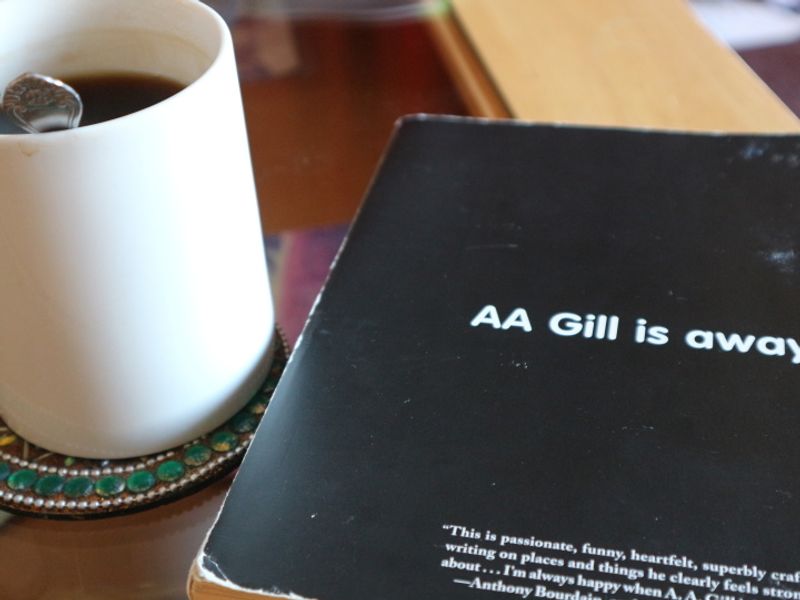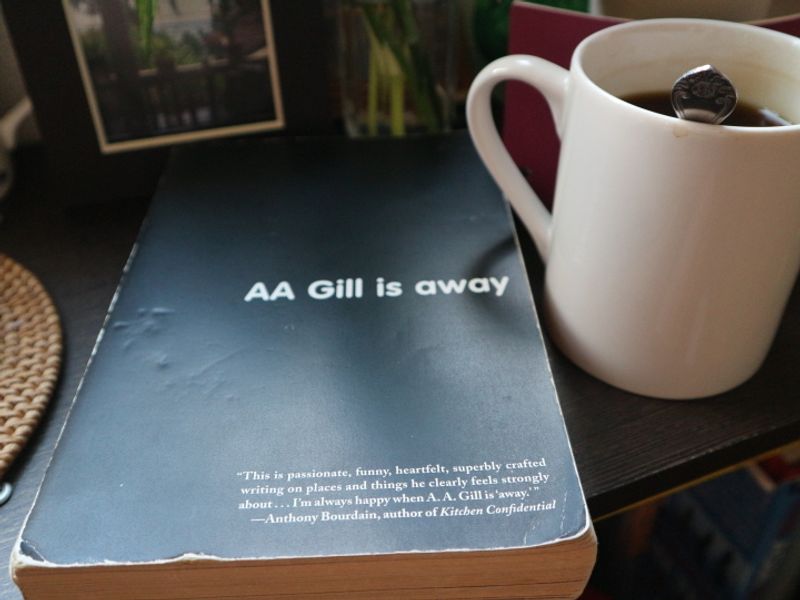Jul 21, 2017
Books what I have read to me help me understand Japan: AA Gill is away
I consider myself something of a “reader” and I’m interested in the pages being turned by others so to this end I’m going to try and put together a small series of posts about books that I’ve read about Japan in order to have prepared for and / or help me to better understand Japan (or at least get some other perspectives on living and travelling here). However, despite a fondness for a bit of a read, as will soon become abundantly clear, I’m no literary critic so please forgive me as I try and fumble through my opinions on the following texts, the first of which is "AA Gill is away", by AA Gill.
Oh, and the grammatical error in the title of this post was made with purpose.

AA Gill (Adrian Anthony) was a British writer who, during his peak was probably one of the most widely read columnists in the land with his critiques in the Sunday Times sparking laughter, anger, emphatic agreement and equally emphatic opposition. AA Gill didn’t hide his opinion and when he wrote it down he amplified it tenfold. Whether you agree with him or not, what can’t be disputed is the unique way he handled the English language. So unique in fact, that Gill himself admitted to at times just making words up. Personally, he was a great influence on me. I love the way he makes scholarly prose accessible like a tabloid newspaper. And he really is laugh out loud funny. Technically that “is” should be a “was”. Gill died in December 2016 after suffering from what he described as “the full English” of cancer.
“AA Gill is away” is actually a collection of travel articles written by Gill. The book was first published in the U.K. in 2002 by Cassell & Co. I have a paperback edition published by Simon & Schuster Paperbacks in 2005. I bought it from the books section that used to be on the top floor of the Tower Records in Shibuya. I wasn’t looking for it, back then I was a fan of anything “travel” and was also drawn to it by its simple black cover. (A reflection of Gill’s humor, perhaps?)
Among the articles in “AA Gill is away” is one entitled “Mad in Japan” written about a trip to Tokyo Gill took in September 2001.

In "Mad in Japan", after an initial, and unusually gentle, comparison between the Japanese and the British (island nations and all the rest of it) Gill launches into his typically brutal observations bringing regular readers back to familiar territory. Of the Japanese,
“ … after ten minutes in the land of the rising sun, you realize the Japs are off the map, out of the game, on another planet. It’s not that they’re aliens, but they are the people that aliens might be if they’d learnt Human by correspondence course … “.
Of course, one can’t make such extraordinary claims without backing them up. (Although how many of us have been guilty of the occasional lapse into lazy “weird Japan” social media contributions?). And back them up he does, in his own way. Falling victim to Gill’s vicious pen are the toilets (“... twenty-first-century bogs and thirteenth-century bog roll.”), and the plastic food displays (“Only a Japanese person could see a plate of propylene curry and say: “Yum, I’ll have that.”). But these can really be taken or left behind, they are of little importance. What Gill gets his teeth into are the people and Japanese society as a whole;
“How come Japan has such commercial success but still manages to be a socially weird disaster? Because, have no doubts, they’re not happy.”.
I think until I had read this line, I’d never really thought of a nation’s populace being collectively unhappy. I mean, we see nations at war on the TV and are shown lots of images of people looking unhappy (to say the least, and very understandable) but one always has the feeling of hope, that this will end, that things will get better. Gill seems to be saying of the Japanese that they are an unhappy collective by default, or nature even. The key reason for this he thinks is religion. He’s critical of Shinto for lacking “the most rudimentary theology” and that oft used turn of phrase about the Japanese being born Shinto, married Christian and buried Buddhist, Gill states has the consequence of the Japanese believing “everything and nothing”. I’d have to agree here. I’m not religious myself but this pic n mix approach to theology, from a distance, looks like playful habit, like putting out a mince pie for Santa’s reindeer at Christmas, rather than getting to the crux of anything spiritual. Not that I see anything wrong with this and nor would I cite it as causing the Japanese be miserable (which I don’t think they are).
One wonders how Gill would see the role of religion (or lack thereof) in Japanese society now at time when increasingly vocal atheist intellectuals, lead posthumously by Christopher Hitchens, are proscribing less religion as a cure to the world’s ills (sometimes citing Japan as an example of how good things could be).
Still, it’s a lack of religion, or at least genuine spirituality, that is at the core of Gill’s further biting observations about the Japanese and their society; the lack of individuality where a person’s only self worth comes in the form of a job but that same job existing in a culture of work that is based on a fear of shame.
In one of Gill’s more interesting observations about Japan he is informed that there is, “worryingly”, no indigenous word for the female orgasm. “Worryingly” sets the tone for the following passages about Japanese attitudes towards sex, femininity and a male-dominated society. He attacks the vanity of the Japanese male; “Hairdressing, waxing, face-packing, ear-grouting and general pandering and pampering to aesthetic hypochondria are multimillion-yen businesses.” But this pales in comparison to his anger at the treatment of women in Japan which he writes is on display in the “dehumanizing view of women in manga”. Now, anyone who’s kept at least one ear to the news in Japan over the last couple of years will have heard the term “womenomics”, prime minister Shinzo Abe’s campaign to address gender inequality. How this is getting on, I would be lying if I said I knew. There are those who will likely see it as empty promise as there are those who will likely cite success stories. One thing that we can be sure of though, is that womenomics has done nothing to address the distressing treatment of the female characters in manga. If Gill were able to come back to Japan today, 16 years on, he would see little change in the nation’s comic books.
Earlier this month, Japan passed a new law regulating underage schoolgirl dating services which now prohibits girls younger than 18 from being employed by “JK businesses”. (JK - joshi kosei - high school girl). That it’s taken until 2017 for the powers that be in Japan to even “regulate” such a nefarious industry should send a shiver down our spine. Gill made a similar observation in 2001 in what he described as “the violent sexualising of their youth” when talking about the behaviour of younger girls in Japan. The consequence of this, he cites, is that “they consume; they shop with myopic concentration.” And this is true to a certain extent - the Japanese do love a good shop. It had never occurred to me that in a certain demographic of shopper the reason behind it might be so depressing.
By the end of Mad in Japan we’re hoping / thinking that maybe Gill might surprise us and say something positive about Japan. He doesn’t. In fact he arguably saves his most brutal observation for last;
“You never feel love here. They have obsession, yearning and cold observation - even beauty and devotion - but nothing is done or said with the spontaneous exuberance of love … “.
Clearly Gill only spent a short time in Japan (he openly admits in the book’s introduction that he doesn’t stick around) and I’m fairly sure that most people who’ve spent a good bit of time here could categorically show this "lack of love" to be untrue. I know that I can. And anyway, I think I can detect a sense of genuine care and concern in Gill’s words here, although I would speculate that he wouldn’t want to admit to this. Gill thrived on getting his readers wound up and seemed not to care about seeking sympathy or agreement.
“Mad in Japan” is only about twelve pages of a book, but it’s possibly the most unique twelve pages I’ve read about Japan, anywhere. I don’t agree with half of what AA Gill says and I know he’s trying to wind me up, but none of this stops him being laugh out loud funny. All of “AA Gill is away” is a great read. Just take it with a pinch of salt.
I’d really like to know what books about Japan you’ve read and if you’ve got any recommendations.




3 Comments
genkidesu
on Jul 22
I wish I had more time to read - but one I found useful/insightful was Hiroshima by John Hersey. With the way the world is these days I think it's so important to reflect on the impact war has, and how it can be prevented.
KamaT
on Jul 24
@genkidesu " Hiroshima by John Hersey" - I'll keep a look out for it. Thanks for the suggestion. Yea, these days I'm doing most of my reading on trains to/from work.
DaveJpn
on Jul 25
Lost in Japan by Alex Kerr. Worth a look.